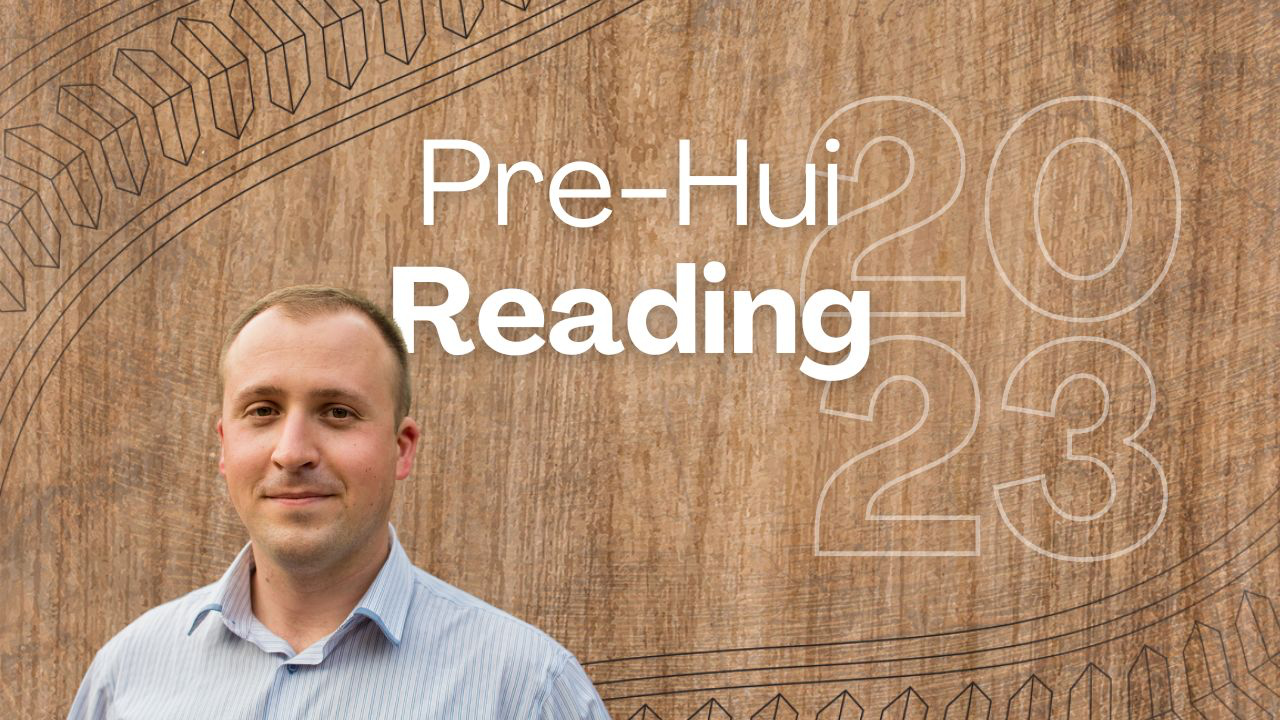
The most significant all-together gathering each year for Baptist churches in New Zealand is our annual National Hui (aka Assembly), this year being held at Manukau City Baptist Church, 2-4 November. Each local Baptist church around the motu can send delegates as their representatives as we worship God, celebrate, and engage together on issues to do with the life and work of the Baptist ‘tribe’ of Christians in Aotearoa New Zealand.
This year the Hui theme is Baptists shaping our future | ngau nui, ngau roa, hei ngao matariki. Whether it's the next steps on our treaty journey, our young people, the constitution that shapes us, our posture in engaging with difficult conversations, stewarding our assets, ensuring our people and places are safe, or determining our hand-carved mission… it’s time to take some big bites to ensure gospel renewal of people and places in Aotearoa and beyond. The main sessions at Hui have pre-reading to help get Hui delegates up to speed, as well as to keep the ‘Team of 40,000’ Baptists informed on what is happening on their behalf at Hui. Below is the pre-hui read for:
Big Bite 3: A mechanism to ensure our people and places are safe
Geraldine Crudge is an Associate at Watermark Employment Law.
Is our ecclesiology fit for purpose in 2023?
I appreciate it’s not intuitive to think a lawyer might have something to say about ecclesiology. It’s not a word or concept that crops up much at law school or in legal practice. But in my experience doing work for and within the Baptist Union of New Zealand, Baptist ecclesiology can be a barrier to keeping those in the pews safe.
New Zealand Baptist ecclesiology
Ecclesiology is the study of the church, and one of the things that falls out of a particular ecclesiology is “how we do church”, that is, the structures and procedures a church or denomination puts in place to organise itself.
Amongst Baptists in New Zealand, my observation is that one of the key beliefs that is held dear is in the ‘autonomy of the local church’. It is a strongly held and defended principle that the local church has autonomy over the decisions it makes, and how it conducts its affairs, including who it calls as a pastoral leader and whether it terminates any such call.
This concept is – more or less – enshrined in the Baptist Union of New Zealand’s Constitution (“Constitution”). After listing the six articles of faith at clause 5, the Constitution provides:
Subject to its acceptance of the foregoing articles of Faith every church in membership with the Union shall have liberty to interpret and administer the laws of Christ and to govern its own affairs.[1] [emphasis added]
Baptist churches around the country are not consistent in their individual constitutions – some local churches allow the Union (either via the National Leader or via the Regional Association) to step in, others are silent on whether the Union can do this.
What’s wrong with this?
The law firm I work for works with the Baptist Union of New Zealand – through the National Support Centre and Regional Leaders, and also directly for local Baptist churches. Often, we’re involved because there are allegations that someone has been sexually or emotionally abused or harmed, and we assist by conducting investigations, and providing advice around process.
Some illustrations are helpful. What follows is a flavour of some of the issues that have been happening around the country within Baptist churches in New Zealand over the last couple of years. Key details and facts have been changed, but the gist remains the same. I’ve also set out some of the questions we are asked, and some of the problems that we encounter:
>> An associate pastor (Z) assaults a teenage girl at a youth event. Later, Z was very sorry for his actions, and talked to his senior pastor about it, who informed the elders. Following an independent investigation (which the Regional Leader encouraged the elders into conducting), several recommendations were made, including that Z is not involved with the youth group for a stand down period of a year. The elders were not happy about this recommendation: they leaned heavily on the doctrine of grace, said this was a one-off incident, and said that no one else in the congregation could lead the youth group in the meantime.
> Should this pastor continue working with youth? Can the wider Union require the stand down period recommended by the review?
> How does the wider Union intervene? Should it?
Key issues that arise out of the local church being autonomous
Whilst each of these scenarios raise different issues that are peculiar to their particular facts, there are some common themes and issues that arise:
1. We are asking a lot of our volunteer elders.
Our volunteer elders’ groups around the country are sometimes having to deal with really hard scenarios, that they aren’t usually trained to deal with. Elders often step into eldership to support the pastor, to pray and champion the local church, because they love Jesus, but not because they are Human Resource professionals and have the expertise to navigate allegations of abuse.
Further, it’s hard to make an objective decision about someone who is also your pastor and you have a personal relationship with – for example, it’s hard to be objective about someone you’ve had round to dinner, who has kids that your kids are friends with, or who came and prayed with you and your family following a recent bereavement.
2. We are relying on relationships to keep people safe.
Our Regional Leaders, National Leader and National Support Centre staff are having to put a lot of time and energy into walking alongside eldership groups, helping them to make decisions, and in some cases leaning heavily on relationship and persuasion to encourage these eldership groups to make the best decision in the interests of protecting congregations and keeping our people safe. We are hoping that their powers of reason and persuasion carry the day.
3. We do not have a mandatory central reporting system for abuse or complaints that come from Baptist churches, and therefore do not have the whole scope of the situation across the Baptist Union of churches.
A pastor could resign in one part of the country and be appointed in another, and there is no way of tracking or preventing that. The Privacy Act 2020 prevents a local church telling another local church or the wider Union what it may have found during an investigation about someone. Given pastor registration is not compulsory, and there are no mandatory reporting requirements on churches, there is no central registration body a local church can check with before it engages a pastor.
4. There is an expectation that the Baptist Union (be that Assembly Council, the National Leader, or the National Support Centre) should be able to “do something”.
I am frequently asked “what can we do?”. There is an expectation that the Baptist Support Centre, National Leader, Assembly Council or Regional Associations should be able to intervene or “fix” the situation. Not all local church constitutions allow the National Leader to intervene, and not all pastors are registered. The expectations on the wider Union do not match the legal reality. It’s not only internally, but externally – society expects something of the Baptist Union. It does not seem adequate to say to the media or outside enquirers that each Baptist church is autonomous and runs itself, and that the representative group (Assembly Council) and the National Leader can’t intervene. What does associating together as a union mean in practice?
5. The power in each of these situations sits with the leadership of the local church, who are often not objective.
Fresh, independent eyes are often able to appraise a situation and make decisions that are not impacted by the personalities and relationships that inevitably arise in the local church.
What does the constitution currently allow us to do?
The Baptist Union of New Zealand constitution currently has two mechanisms to try and do something about these scenarios:
1. Clause 10 of the Constitution allows the Assembly, on the recommendation of the Assembly Council, to suspend or exclude a church from membership if it has “acted in a manner contrary to the general objects of or calculated to injure the Union”.
2. The Baptist Union keeps an “Official List of its Ministers” which includes Registered and Provisionally Registered Ministers, Accredited Ministers, any other persons that a member church has chosen as a senior or sole pastor and other persons recognised by member churches as pastoral staff. The Official List is reviewed each year by Assembly Council. Clause 35 of the Constitution provides that “in the event of any person whose name appears on the Official List being proved to the satisfaction of the Assembly Council…to have been guilty of improper conduct, or to have acted in a manner contrary to the general objects of or calculated to injure the Union, the Assembly Council shall have power to suspend….or…remove…such persons from the Official List.”
Please note though, that you don’t have to be on the Official List to be a sole or senior pastor of a Baptist church. Local churches have autonomy to call who they like as their pastoral leader, so whilst Assembly Council can remove a pastor from the Official List, a local church can still call (or continue to call) that person to lead them.
In essence, the Baptist Union of New Zealand can kick an entire church out of the Union because it continues to call a pastor the Union doesn’t approve of – and that’s about it. That seems an extreme and draconian response to an entire faith community, because of a pastor who isn’t protecting their people – and ultimately doesn’t keep that faith community safe.
In 2015, the Assembly [National Hui] resolved that same sex marriages were not allowed to be conducted in Baptist Union properties, and if a Baptist celebrant conducted a same sex marriage ceremony, the marriage celebrant, in the first instance, will no longer be nominated to the Registrar of Marriages by the Baptist Union of New Zealand. To me, this is an example of the Assembly cutting across the autonomy of the local church – if the Assembly have done this about same sex marriage, surely it could do this to protect people in the pews, and make Baptist churches safer places to worship in.
Way forward
The Assembly (Hui) needs to decide what is important. If it decides that the independence and autonomy of the local church to make its own decisions is what’s more important, then the Assembly needs to be comfortable with the possible ramifications of that decision as a movement.
However, if the Assembly decide that having someone from outside the local church being able to step in and remove or suspend a pastoral leader to keep people safe is what’s important, then it needs to amend the constitution and the current system. In essence, the ability to do this would curtail a local church’s ability to make its own decisions.
The key question is where should the power sit when pastors are accused of misconduct – with the local church, or with some other body, somewhat removed from the local context?
If the Assembly wants the power to sit somewhere other than the local church, there are different ways this could be achieved. For example:
1. Pastor Registration could be compulsory. Under this model, a local Baptist Church could only call a pastor if they are registered (and therefore vetted) through the Baptist Union. Churches could be required to report all allegations of misconduct to the registration body, or report all investigations of allegations of misconduct, to the registration body.
2. There could be a requirement that all investigations into allegations of misconduct by someone in leadership in a local church be conducted by the National Support Centre (or someone else independent) and be reported to Assembly Council for a decision, who then can decide whether a church can continue to call that pastor and/or whether they should be suspended from ministry. However, there would need to be a mechanism to ensure the pastor did not get a role at another Baptist church during any period of suspension.
3. All Baptist churches could be required to amend their constitutions to allow the Regional Association to step in if allegations of misconduct are made and take over decision-making for the eldership. Again, there would need to be a central repository of information and reporting, to ensure someone found guilty of misconduct did not get engaged at another church straight away.
---------------------------------------------------------
We invite delegates at this year’s National Hui to engage with the session we’re calling: ‘Big Bite 3: A mechanism to ensure our people and places are safe’. Over the 100-minute slot on the Saturday, Geraldine Crudge will unpack more around this topic. This will be followed by a panel discussion that will approach this from various angles (on the panel will be Geraldine, Reti Ah-Voa, Steven Goulstone, John Tucker, and Charles Hewlett). There will then be conversation together with all Hui delegates. A potential outcome of this will be that delegates go back to their sending churches seeking this commitment:
Our faith community supports the Baptist Union developing a mechanism that might override aspects of autonomy, in order to keep our people and places safe.
Let us pray together for the wisdom and guidance of God.
---------------------------------------------------------
Recommended listening: a victim’s voice and story of abuse in the church
In September 2023 a New Zealand podcast series was published that helps us understand the importance of ensuing our people and places are safe. It is not pleasant listening, and listener discretion is advised:
Dear Jane is a five-part series for The Spinoff, exploring the impact of a sexual relationship between a young teenage girl and her adult youth group leader. Dear Jane was made with the support of NZ On Air. Listen on: Spotify, Apple Podcasts, The Spinoff website.
If this podcast series brings up any issues for you there is help available 24-7: Helpline - free call or text 1737 Youthline - phone 0800 376 633, free text 234 or email [email protected] Suicide Crisis Helpline - phone 0508 828 865 (0508 TAUTOKO)
-----------------------------------------
Hui Programme
The Hui programme is online here.
Other Pre-Hui Reads
A posture of humility for difficult conversations (pre-Hui read: Big Bite 1) by Christa McKirland
A new way of making decisions together (pre-Hui read: Big Bite 2) by Peter Crow and Wayne Schache
An alignment of our assets for gospel renewal (pre-Hui read: Big Bite 4) by Charles Hewlett and Wayne Schache
A Baptist way to make decisions (pre-Hui read: Big Bites 1-4) by John Tucker
He Koronga Maatou – We have a dream (pre-Hui read: Baptist Māori) by Luke Kaa-Morgan
He Rito: The future of the church (pre-Hui read: Our young people) by Ethan Miller
The morning after (pre-Hui read – Arotahi) by Kelly Enright
Photo: Hui 2023 artwork
[1] See Part IV of the Constitution, headed Doctrinal Beliefs.


